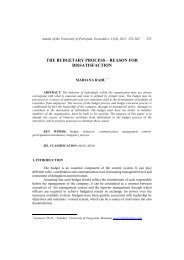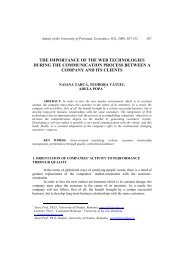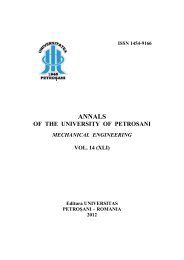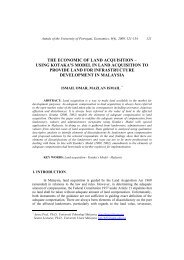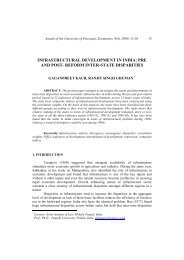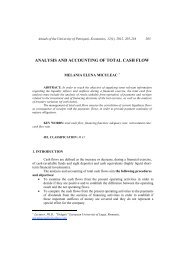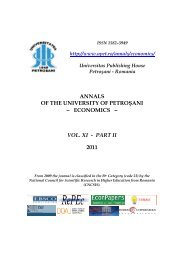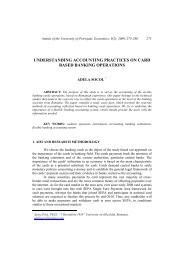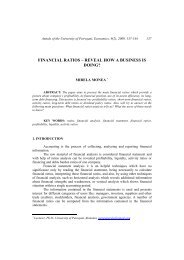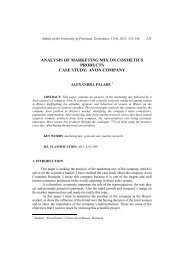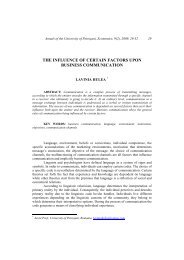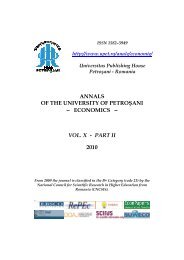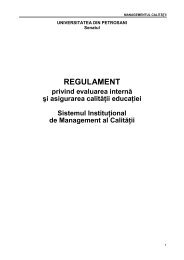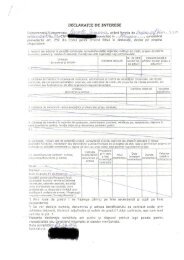annals of the university of petroÅani â¼ economics â¼ vol. xi - part i ...
annals of the university of petroÅani â¼ economics â¼ vol. xi - part i ...
annals of the university of petroÅani â¼ economics â¼ vol. xi - part i ...
Create successful ePaper yourself
Turn your PDF publications into a flip-book with our unique Google optimized e-Paper software.
38 Brezeanu, P.; Celea, S.; Stanciu, A.P.<br />
acquisition cost plus o<strong>the</strong>r expenses. In general, <strong>the</strong> <strong>of</strong>fshore company is integrated in<br />
<strong>the</strong> median transaction and <strong>the</strong> pr<strong>of</strong>it is recorded in its own documents. In this way,<br />
pr<strong>of</strong>it is oriented from a high fiscal burden area to one with very lax taxation. The<br />
<strong>of</strong>fshore company will receive fur<strong>the</strong>r orders from customers and goods will follow <strong>the</strong><br />
same circuit. The interesting thing is that <strong>the</strong> advantages are for both <strong>the</strong> seller and <strong>the</strong><br />
buyer.<br />
Cash flow<br />
Seller<br />
Off<br />
Shore<br />
Buyer<br />
Real flow<br />
Figure 4. The implementation <strong>of</strong> an <strong>of</strong>f-shore company within a commercial transaction<br />
The seller will transfer <strong>the</strong> pr<strong>of</strong>it arising from <strong>the</strong> differential between <strong>the</strong> cost<br />
<strong>of</strong> goods sold and <strong>the</strong> selling price and <strong>the</strong> buyer will not pay tax on <strong>the</strong> difference<br />
between <strong>the</strong> purchase price <strong>of</strong> goods and <strong>the</strong> selling price <strong>of</strong> goods in his country. A<br />
holding company may be incorporated in a fiscally advantageous jurisdiction to<br />
finance <strong>the</strong> group entities located in tax disadvantaged areas. There can be remarked<br />
<strong>the</strong> following positive aspects: by exploiting <strong>the</strong> double taxation agreements, entities<br />
within <strong>the</strong> group obtain funding at a reduced cost; deductibility will apply to pr<strong>of</strong>its<br />
generated by sub-entities within <strong>the</strong> group by virtue <strong>of</strong> <strong>the</strong> interest rate, and tax due on<br />
interest is reduced up to elimination; a share issue becomes possible within <strong>the</strong> entities<br />
in <strong>the</strong> group without incurring tax imposed on pr<strong>of</strong>its from <strong>the</strong> capital; <strong>the</strong>re can be<br />
directed fees towards <strong>the</strong> <strong>of</strong>f-shore company as well.<br />
3.2. Illegal fiscal evasion<br />
Illegal tax evasion in<strong>vol</strong>ves <strong>the</strong> deliberate avoidance <strong>of</strong> payment <strong>of</strong> taxes,<br />
being subject to punitive action. Generally, tax evasion in<strong>vol</strong>ves unlawful clouding <strong>of</strong><br />
<strong>part</strong> <strong>of</strong> taxable materials in order to reduce <strong>the</strong> tax burden. The following forms can be<br />
distinguished:<br />
traditional fiscal evasion in virtue <strong>of</strong> avoiding tax liability payment by making false<br />
related documents or non-creation <strong>of</strong> <strong>the</strong>se documents; In this case, <strong>the</strong>re can be<br />
used <strong>the</strong> following procedures: <strong>the</strong> elaboration <strong>of</strong> false VAT documents;<br />
intentionally reducing <strong>the</strong> tax base by not including income. In general, sales are<br />
made without billing and cash receipts without receipts; intentional cost reduction<br />
in order to reduce <strong>the</strong> tax base; production <strong>of</strong> illegal goods and services; carrying



